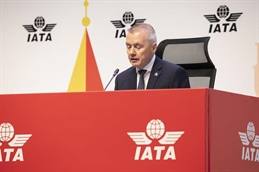
The aviation industry is poised for growth in the next 20 years, albeit at a slower pace than the previous decades, as challenges continue to hound the industry, from supply chain issues to aircraft delivery delays.
Willie Walsh, director-general at IATA, told the recent Changi Aviation Summit in Singapore that the progress and recovery of the industry from the pandemic continued strongly during 2023, with the full year 2023 at just over 94% of where we were in 2019 – consisting of strong domestic markets and slower international demand.
"Now, if we look at this region, the situation was slightly less than that, overall at 86% of where the region was in 2019," he said.
Looking forward, Walsh said IATA estimates that over the next 20 years, the industry will grow at about 3.3% per annum.
Walsh noted that the figure is "significantly lower" than the growth we witnessed during 2010 to 2019.
Supply chain issues seen to continue
"But I think it does reflect some of the challenges that we as an industry are facing and will face going into the future. Infrastructure constraints both in the air and on the ground," he said.
"Supply chain issues, which have now been a feature of the industry for a number of years and are likely to continue for a few more years. The delay and delivery of new aircraft, the problems in relation to engines, labour shortages in some parts of the world, and significantly the cost impact of our transition to net zero in 2050," the IATA director-general said.
Meanwhile, Walsh noted that cost associated with transitioning to net zero would also impact the industry, with costs will have to be ultimately reflected in the ticket prices, which will have a dampening effect on the level of growth that the industry sees going forward.
"Now I'm pleased to say this region is likely to lead the markets with growth of around 4.5% per annum during that same period," Walsh said.
The IATA director-general noted that in 2023, international travel within the Asia-Pacific region had fallen to 9.7%.
"So, this is a huge opportunity for continuing recovery in the market here, and I'm excited about what things are going to look like in the years ahead," Walsh said.
In terms of the environment, Walsh stressed the need for further production and development of sustainable fuel.
"This industry is absolutely committed to achieving net zero CO2 in 2050. And we cannot fail or falter in our efforts to achieve that goal. It is absolutely essential that we work together to ensure that we can credibly provide people with confidence that we have a pathway to decarbonize our industry," he said.
"... central to achieving our goal will be the use of sustainable aviation fuel. For us, this is the most important issue in the short to medium term," Walsh said.
The IATA director-general cited the strong demand for SAF.
"Every single drop of sustainable aviation fuel that has been produced has been used by the industry. In 2020, 2021, 2022, during the height of the pandemic, the industry continued to invest in this expensive product. And I've absolutely no doubt that we will continue to do so," he said.
"What we need to see as an industry is greater production. We need to see governments providing the incentive for production to significantly increase. And with that increase in production, I guarantee you that the airlines will use all of the fuel produced despite the cost impact that will represent," Walsh added.
Walsh said technology and labour issues also present fascinating opportunities for the industry going forward.
"But as I stand and look at the future of this industry, I'm very confident that we can overcome all of the challenges that we're likely to face. We can take confidence in our ability to overcome some significant challenges in recent times," Walsh said, adding that with the right policy frameworks in place from governments, the industry has a very credible path to achieving all of the necessary measures to ensure that we are net zero in 2050.



